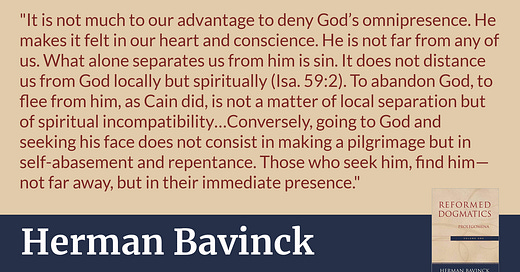Omnipresent HOW?
“You make known to me the path of life; in your presence there is fullness of joy; at your right hand are pleasures forevermore.” (Psalm 16:11, ESV)
Questions For God’s Omnipresence
In last Wednesday’s post, I wrote about God’s attribute of omnipresence. This attribute speaks to the truth that God is “all-present.” He is everywhere at all times. He exists over and above space.
However, I also pointed toward an objection. When learning about this attribute of God, some people question: “Aren’t there places in scripture that speak about God NOT being present? Doesn’t Moses say to God, ‘If your presence will not go with me, do not bring us up from here.’ (Exodus 33:15, ESV) and doesn’t that assume God’s presence could possibly NOT go with them? Don’t Psalmists repeatedly cry out, ‘O my God, be not far from me!’ (Psalm 38:21, ESV)? Why would they say that if God is present everywhere?”
Something to Remember
In answering these questions, there’s one important thing to remember. Every time we speak about God, we are speaking about God from a human perspective. Our language falls short. We are forced to speak metaphorically. Herman Bavinck says, “We can only speak of God in creational terms. Scripture even refers to God’s going, coming, walking, and coming down. It employs human language, the kind of language to which we too are bound. ‘To discover where he is, is hard; to discover where he is not, is even harder.’ It is therefore a good thing in connection with each attribute to remind ourselves that we are speaking of God in human terms.” (Reformed Dogmatics, 168).
Beginning An Answer
With that in mind, we can answer the objection about God’s omnipresence. Again, I’ll let Bavinck give us a basic answer: “In the different places of his creation [God] is even present to a different degree and in a different manner.” (Reformed Dogmatics, 164). So, God is present everywhere in His creation, however He is not present everywhere in the same way. That’s important.
Present to Punish, Sustain, or Bless
Wayne Grudem builds off this truth and shows how scripture speaks about God being present to punish, to sustain/uphold, and to bless.
There’s a frightening passage in Amos (9:1-4) that speaks of God being present to punish. After repeatedly showing how they will not be able to flee from His presence, God says, “I will fix my eyes upon them for evil and not for good.” (Amos 9:4, ESV). On this dark note, it’s important to point out that this is the way God will be present in hell. He will be present to punish.
Scripture also speaks about God being present to sustain/uphold. In Colossians it says, “And he is before all things, and in him all things hold together.” (Colossians 1:17, ESV). In Him—which is to say, “in his presence”—all things hold together. By His presence, God is upholding and sustaining all of creation.
Yet, the primary way scripture speaks about God’s presence is his presence to bless. The Psalm at the beginning of this post is a perfect example: “You make known to me the path of life; in your presence there is fullness of joy; at your right hand are pleasures forevermore.” (Psalm 16:11, ESV). In God’s presence is fullness of joy—the epitome of blessing. In a beautiful way, this is how God is present in heaven—where there is fullness of joy.
Far And Near
Since blessing is most commonly connected with God’s presence in scripture, we can understand other passages that use the terminology of “near” and “far.” This is why Proverbs can say, “The LORD is far from the wicked, but he hears the prayer of the righteous.” (Proverbs 15:29, ESV). God does not bless the wicked—his presence to bless is “far” from them.
Answering the Question
Once you get to this point of the post, I hope the answer to the question is becoming more obvious. Why does Moses plead with God, “If your presence will not go with me, do not bring us up from here.” (Exodus 33:15, ESV)? He’s pleading this because he knows God’s people need God’s blessing to accomplish anything. If God is not present to bless, Moses knows “all is lost.” Why does the Psalmist cry out, “Be not far from me!” (Psalm 38:21, ESV)? He feels like God is no longer present to bless him. He feels like God’s blessing is slipping away. And, just like Moses, he knows he can’t do anything apart from God’s blessing. So, he cries out, “God please return to me with your blessing!”
Final Application
I want to end with a final note of application from Herman Bavinck:
“It is not much to our advantage to deny God’s omnipresence. He makes it felt in our heart and conscience. He is not far from any of us. What alone separates us from him is sin. It does not distance us from God locally but spiritually (Isa. 59:2). To abandon God, to flee from him, as Cain did, is not a matter of local separation but of spiritual incompatibility…Conversely, going to God and seeking his face does not consist in making a pilgrimage but in self-abasement and repentance. Those who seek him, find him—not far away, but in their immediate presence.” (Reformed Dogmatics, 169–170).



